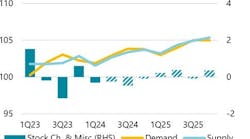The price of oil continues to pinch in Japan. To be sure, the world’s benchmark super crude oil tanker rates from the Gulf to Japan fell to 7-month lows last week due to ample availability of vessels.
Baltic Exchange data showed freight rates for very large crude carriers in the export route from the Gulf to Japan fell to Worldscale 151 late on July 31, dropping by 29.5 points from the day before.
That was the lowest level since early June and the biggest single-day drop since early January for the 2 million bbl vessels plying the route.
Still, Japanese leaders are taking no chances on continued low rates for oil or oil transport from the Middle East as underlined by a free-trade agreement signed between Japan and Brunei in June 2007 came into effect July 31.
Reducing dependency
It was another effort by Tokyo to reduce dependency on Middle Eastern supplies and shorten its long and expensive supply chain from the gulf.
The agreement will substantially increase investment in Brunei, with Japan being the sultanate’s largest export destination. Brunei sent shipments worth around ¥293.8 billion in 2007, mainly in the form of oil and natural gas.
It is also an important step for resource-poor Japan in its efforts to secure stable energy supplies, with around 70% of the country’s total imports of LNG coming from Brunei.
Japan’s efforts to diversify from Middle Eastern oil have achieved modest success as crude oil imports in June declined 9.4% from a year earlier to 105.80 million bbl.
Imports from the Middle East captured 83.6% of that total, down 2.5%. It represented the fifth consecutive month that the Middle Eastern share slipped below the year-before level.
Saudi Arabia remained the biggest crude exporter to Japan, accounting for 31.64 million bbl, up 0.8%. Following Saudi Arabia was the UAE with exports at 25.73 million bbl, down 7.3%.
Qatar replaces Iran
Qatar replaced Iran as the third biggest crude exporter to Japan by boosting exports 53.6% to 13.33 million bbl against Iran’s 8.24 million bbl, down 53.4%. For the record, Russia was fifth on the list with 4.91 million bbl, up 2.2%.
But more has to be done about pricing as Japan’s military may have to cancel its largest annual naval exercise for the first time in half a century due to soaring energy prices.
The Maritime Self-Defense Force’s maneuvers have not been called off since it started in 1954, even during the oil crisis of the 1970s.
This year’s drill was planned for November, although official dates had not been announced.
“In order to secure enough fuel for emergency relief activities, we’ve cut down on the scope of our exercises, but there is a limit,” said a MSDF official.
“Now,” he said, “we are considering canceling the upcoming large-scale naval drill, which would consume large amounts of fuel.”

